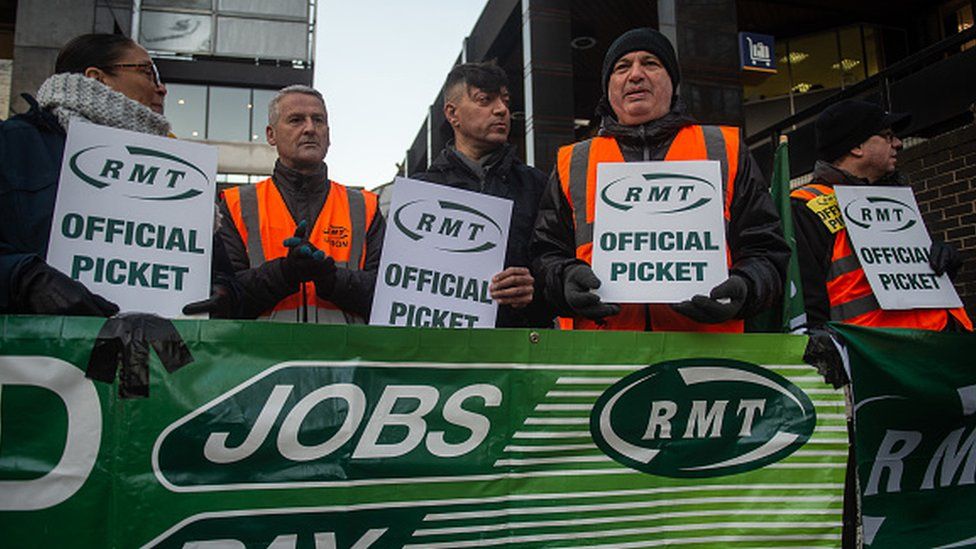But Rishi Sunak says ensuring basic services are provided during strikes is “entirely reasonable”.
 Image source, Getty Images
Image source, Getty ImagesLawyers say they expect the UK government’s planned laws on enforcing minimum service levels during strikes to be hampered by legal challenges.
Unions could be sued if basic services are not provided in key sectors under the proposed anti-strike laws.
Some unions have threatened legal action and say they believe the strike restrictions would be unlawful.
Labour says it would repeal such laws, calling them a “legislative weapon” used for political reasons.
The law was announced on Thursday after weeks of industrial strife, with key public services paralysed by large-scale strikes.
Prime Minister Rishi Sunak has defended the new law as an “entirely reasonable” way to balance the freedom to strike with “the right of ordinary working people to go about their lives free from significant disruption”.
But employment lawyers have told the BBC the proposed law has raised serious legal questions and would be contested by unions in court.
The government says the law would introduce “minimum safety levels” for fire, ambulance and rail services and would consult on what that means for these sectors.
For other sectors, including health services, education and border security, the government would only consult on minimum safety levels if voluntary positions are not agreed.
The government is yet to spell out what those minimum levels might be, or who defines them.
Richard Arthur, head of trade union law at Thompsons Solicitors, said the introduction of minimum safety levels would not comply with the UK’s obligations under international law.
He said the law could be struck down in court for breaching treaties the UK government has signed up to, such as the European Convention on Human Rights (ECHR).
The ECHR is an international treaty that has been incorporated into UK law.
“Based on what we’ve seen so far, it seems that there’s been no regard paid to international labour standards,” Mr Arthur said. “That has got to raise very serious legal question marks.”
Legal hurdles
Mr Arthur said UK unions could challenge the law in the same way they brought a case against new regulations that would allow agency workers to fill in for striking workers.
In December, the High Court granted permission for a judicial review of what unions called “anti-worker” regulations. The case is expected to be heard early this year.
The unions “may hope for similar success in a judicial review of any future minimum service level legislation”, said Tom Long, employment partner and industrial relations specialist at law firm, Shakespeare Martineau.
But Mr Long said there was no guarantee the unions would be able to win the case in court.
He said the rights of trade unions under the ECHR “can be interfered with where necessary and where such interference can be justified”.
Mr Long said others European countries – including France and Spain – have passed similar laws on minimum service levels.
But Mr Arthur said these laws were “not in effective use” and in Spain’s case, had been “subject to considerable censure” by the country’s courts.
This video can not be played
To play this video you need to enable JavaScript in your browser.
The UK government’s legislation is expected to be published next week, with MPs debating it for the first time the week after. It will apply in England, Scotland and Wales – but not in Northern Ireland.
It is likely to face significant opposition in the House of Lords, as only transport strikes were mentioned in the Conservatives’ 2019 manifesto pledge to introduce minimum service levels.
The legislation would apply to vital public services, including railways, which was disrupted by another 48-hour strike by members of the Rail, Maritime and Transport (RMT) union.
Mick Lynch, general secretary of the RMT, said the legislation would “make strike action completely entrenched”.
“We’ll have to resort to partial strikes, which will mean disputes will become intractable, probably,” he told the BBC.
Mr Lynch said a lawyer had advised the RMT that “much of what they’ve got in mind would be illegal”.